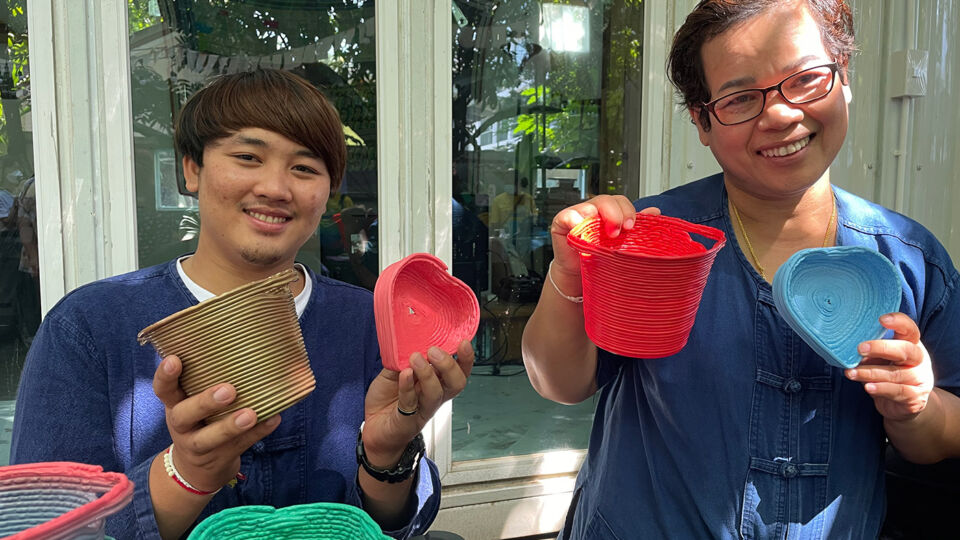I found the workshop down a narrow soi in Bangkok’s old town. Several large sacks of plastic bottle caps, carefully sorted by color, sat by the entrance. Machines filled the rest of the shed.
Small and hand-operated, the machinery was there to be fed. I pressed a green button, and hungry teeth rotated rapidly at the bottom of a clear container, rattling like an aggressive kitchen blender.
I scooped handfuls of orange and red caps into the shredder. Once inside, they danced about like popcorn, becoming ever smaller as the teeth chomped them into tiny, thin flakes. The goal was to turn the caps into something new, ensuring they would no longer head to landfill or, worse, into the ocean.
This was a workshop by Precious Plastic Bangkok, a group promoting plastic recycling in Thailand, and I was there to find out how they were inspiring grassroots recyclers to not only tackle ever-increasing levels of plastic waste but also turn a profit by doing so.
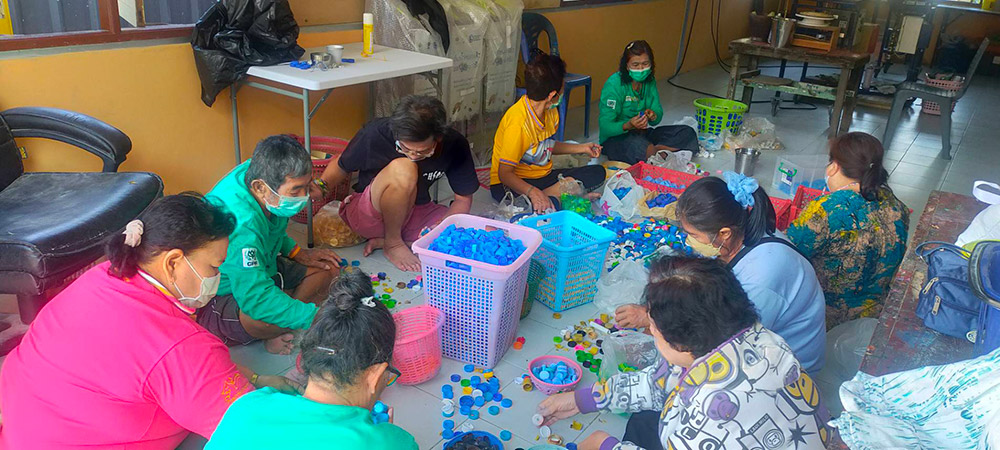
“Precious Plastic provided training on how to use the machines. Then the community groups decided where things went. We supported them with designing and making products as well as marketing, pricing and an overall business plan,” said Dominic Chakrabongse, who heads up Precious Plastic Bangkok.
Pots, bowls, baskets and dishes made from the colorful caps were displayed on shelves on the walls. Guided by enthusiastic staffers Aim and Gao, I learned how they were created. As it turns out, recycling is simple: Plastic is heated and melted, then pressed or molded into a new shape. Then it’s cooled to regain its original solid state.
Running the shredder, the plastic flakes fell into a box at the bottom where they were now the right size to enter the extruder – basically a long pipe with a hopper at one end, a heating element in the middle and a nozzle at the front. I poured the flakes into the hopper and the machine heated them to 160C.
We placed a steel flowerpot mold on a turntable at the front and slowly a red worm of soft plastic emerged from the nozzle, like strange toothpaste squeezed from a tube. There was a slight smell of heated plastic.
While I lacked the finesse of more experienced hands who intervened to help, the coils of melted plastic were soon wrapped nicely around the mold. We dropped it into cold water to harden, after which it was cool enough to touch and remove from the mold. The result was a recognizable plant pot – albeit a bit misshapen – and approximately 40 bottle caps had been recycled in the process.
Precious Plastic Bangkok is part of wider movement aimed at providing entrepreneurs and would-be recyclers with open-source blueprints to build their own recycling machines and set up small businesses around the world. There’s a massive online archive of designs ready to be downloaded.
The machines cost around THB80,000 (US$2,350) to build, and the PepsiCo Foundation has funded kits for seven communities across Thailand.
So, what impact has this had? I spoke to four recyclers from Bangkok to the northernmost reaches to find out.
Inner City
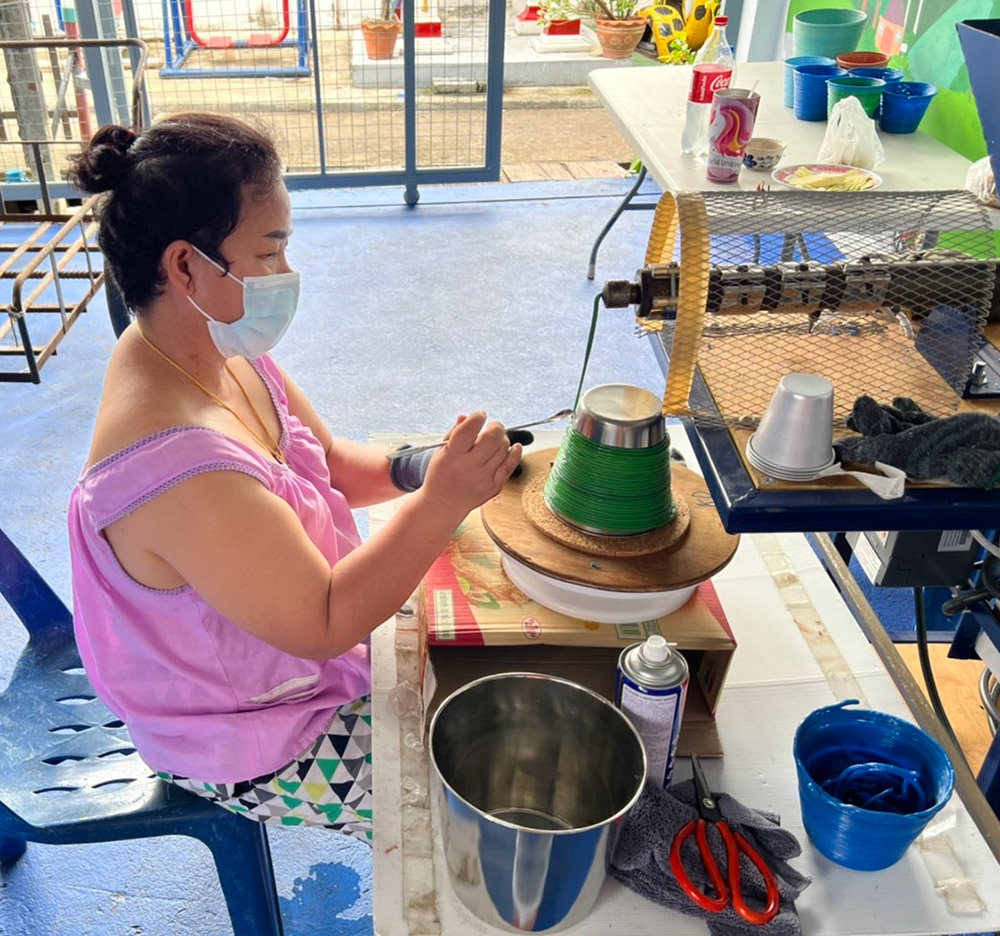
Joy lives on a congested little island called Koh Klang not far from in Khlong Phra Khanong. Although surrounded by the canal, her community is practically underneath the huge Chalong Rat Expressway. It’s a stone’s throw from Sukhumvit Road and BTS On Nut.
“I’ve seen plastic floating down the khlong for years, but not known what to do about it,” Joy said. “I wanted to collect it up, but always wondered what to do after that.”
Communities like hers are often not formally recognized by municipal authorities and therefore don’t have regular waste collection services. Narrow alleyways mean garbage trucks and recycling vehicles struggle to gain access leaving residents to deal with the litter themselves.
Now there’s a Community Enterprise Centre on the island educating residents about the problem with a Precious Plastic machine at its center. They’ve used the plastic collected so far to make cute heart-shaped bowls offered for sale through Precious Plastic’s designated outlets elsewhere in the city.
Joy hopes the machine will interest young people in the area. “I want to inspire them to categorize plastic trash properly. I hope they will get creative as they learn to use the machine,” she enthused.
Down at the beach
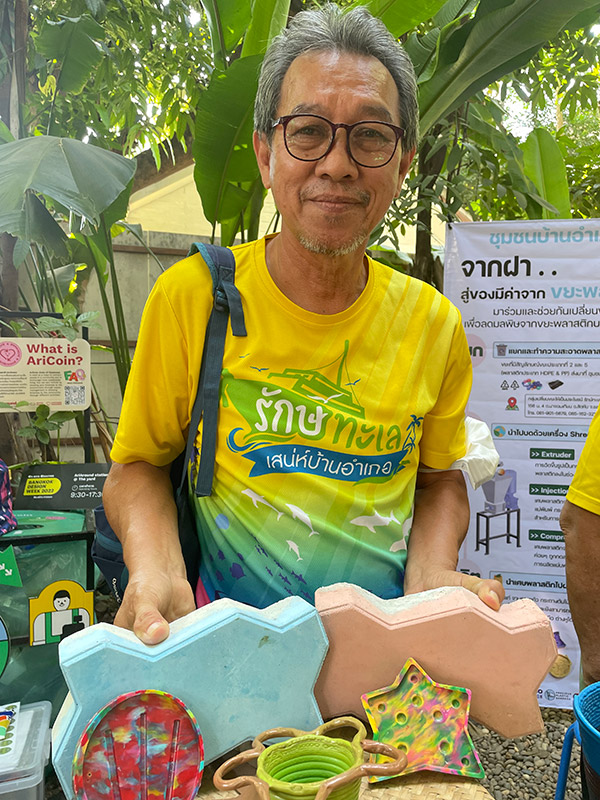
The machine is making a difference outside the city too. Klae runs a community enterprise group near Baan Amphur Beach just south of Pattaya. “A lot of garbage ends up along the beach. It’s not unusual for municipal authorities to collect 35 tons in a single day,” he said.
“The people with businesses in the area want the beach to look good for visiting tourists. I’ve also seen stray plastic clogging up drains and worry about the harm it does to sea life,” he continued.
Backed by enthusiastic locals, he is trying out all sorts of products made from waste plastic including mixing it with concrete to make bricks. Precious Plastic has provided a compressor machine to press the bottle caps into colorful sheets of plastic. These can become wall panels, floor tiles, shelves or be used to make furniture.
“It’s more profitable to recycle the plastic bottle caps we pick up into consumer products than to sell them straight to a recycling company,” Klae said. The money made is used to pay for meals for the group members to enjoy together with visitors to the project.
Where the river meets the sea
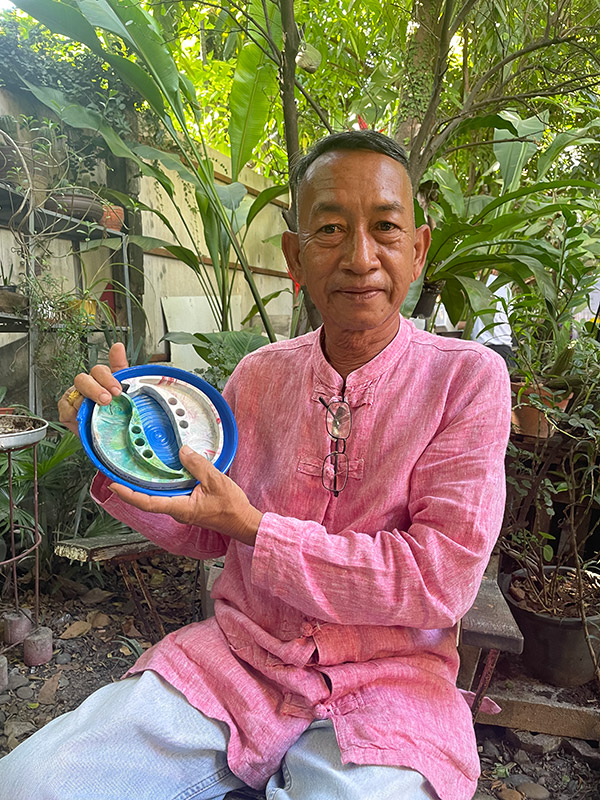
Plastic pollution is also rife southwest of Bangkok in Samut Sakhon province, where Nui has fished for years. “The best mackerel in Thailand is found on the Tha Chin River estuary where I’m from,” he said, smiling. The fisherman works with a group of volunteers living along the riverbank calling themselves Trap the Sea Trash.
“Living here means we see all kinds of rubbish, washed down from settlements inland,” Nui complained. “My community is passionate about dealing with the problem. We have a learning center and recycling drop-off point, where we collect old containers and bottle-caps to use in the machine. Some people gather these straight from the river.”
With quiet pride, he holds up a pair of desk tidies in the shape of the tasty mackerel he catches made entirely from plastic caps collected by the community. Precious Plastic encourages participants to design products that represent the uniqueness of their communities.
Coffee Country
The kit has made its way up to Doi Tung in the northern province of Chiang Rai. There it’s part of a creative learning space run by the Mae Fah Luang Foundation. The students attending come from Tai Yai hill tribe families who farm coffee and macadamia in the surrounding countryside.
The villages and farms are often so remote that waste collection services are non-existent or seriously limited. “If we didn’t have the support of Precious Plastic, we’d see more trash dumped in ponds, waterways and along the roadsides,” said Aon, assistant manager of the foundation’s environmental department.
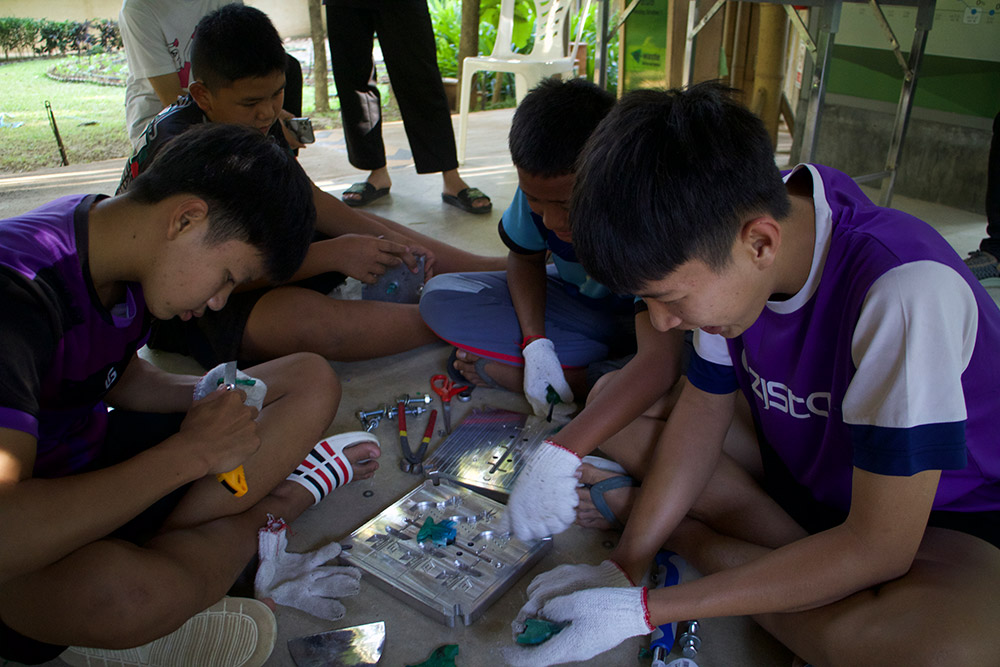
“We use the machine to show youngsters that recycling plastic can add to their livelihoods. Normally collectors of plastic waste get 5-to-7 baht per kilogram, but people can earn 4 times more by upcycling it into products to sell,” Aon said.
The students shyly pose for a photo with the novelty fridge magnets and bag-tags based on mythical creatures from local folklore that they designed together. They chose a deer-like creature that will bring travelers good luck called Tua-To, and Ton-Tung, a spiritual tree able to show people the way to heaven.
As discarded single-use plastic continues to spoil Thailand’s natural beauty, it’s heartening to learn of communities stepping up to find solutions to the problem.
Precious Plastic’s Chakrabongse concludes that the ultimate responsibility for dealing with plastic pollution must rest with the companies and manufacturers who produce it in the first place.
“Thailand desperately needs an Extended Producer Responsibility law so that the onus of recycling and dealing with waste is shifted away from the consumers and back onto the real culprits,” he said.
Returning to the beach, Klae vows to continue his work.
“I’d like to eliminate all plastic waste. As long as it continues to be produced, I will continue to collect it up and find ways to use it again,” he said.
